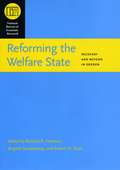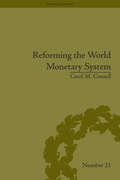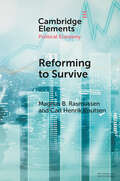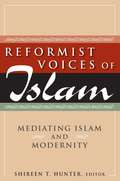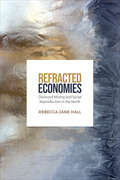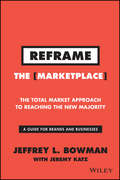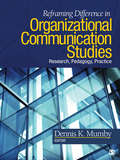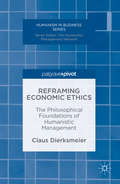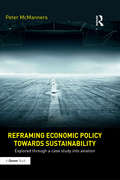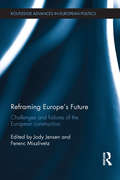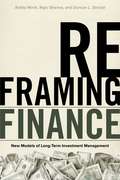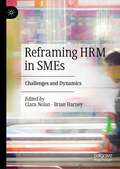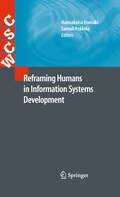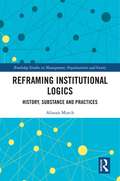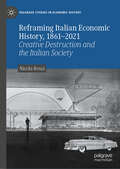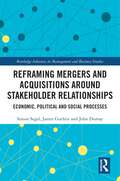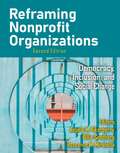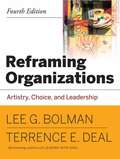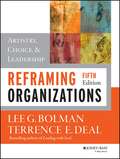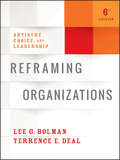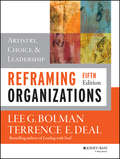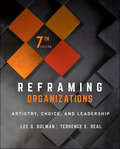- Table View
- List View
Reforming the Welfare State: Recovery and Beyond in Sweden
by Richard B. Freeman Birgitta Swedenborg Robert H. TopelOver the course of the twentieth century, Sweden carried out one of the most ambitious experiments by a capitalist market economy in developing a large and active welfare state. Sweden's generous social programs and the economic equality they fostered became an example for other countries to emulate. Of late, Sweden has also been much discussed as a model of how to deal with financial and economic crisis, due to the country's recovery from a banking crisis in the mid-1990s. At that time economists heatedly debated whether the welfare state caused Sweden's crisis and should be reformed--a debate with clear parallels to current concerns over capitalism. Bringing together leading economists,Reforming the Welfare State examines Sweden's policies in response to the mid-1990s crisis and the implications for the subsequent recovery. Among the issues investigated are the way changes in the labor market, tax and benefit policies, local government policy, industrial structure, and international trade affected Sweden's recovery. The way that Sweden addressed its economic challenges provides valuable insight into the viability of large welfare states, and more broadly, into the way modern economies deal with crisis.
Reforming the World Monetary System: Fritz Machlup and the Bellagio Group (Financial History #21)
by Carol M ConnellFocusing on Fritz Machlup, Connell presents the story of the Bellagio Group and its contribution to modern finance. Initiated by Machlup the Bellagio Group was made up of thirty-two non-government academic economists. During the years between 1964 and 1977 the Group met eighteen times and made a series of recommendations for policymakers.
Reforming to Survive: The Bolshevik Origins of Social Policies (Elements in Political Economy)
by Carl Henrik Knutsen Magnus B. RasmussenThis Element details how elites provide policy concessions when they face credible threats of revolution. Specifically, the authors discuss how the Bolshevik Revolution of 1917 and the subsequent formation of Comintern enhanced elites' perceptions of revolutionary threat by affecting the capacity and motivation of labor movements as well as the elites' interpretation of information signals. These developments incentivized elites to provide policy concessions to urban workers, notably reduced working hours and expanded social transfer programs. The authors assess their argument by using original qualitative and quantitative data. First, they document changes in perceptions of revolutionary threat and strategic policy concessions in early inter-war Norway by using archival and other sources. Second, they code, for example, representatives at the 1919 Comintern meeting to proxy for credibility of domestic revolutionary threat in cross-national analysis. States facing greater threats expanded various social policies to a larger extent than other countries, and some of these differences persisted for decades.
Reformist Voices of Islam: Mediating Islam and Modernity
by Shireen Hunter Shireen T HunterIn recent years, Islamic fundamentalist, revolutionary, and jihadist movements have overshadowed more moderate and reformist voices and trends within Islam. This compelling volume introduces the current generation of reformist thinkers and activists, the intellectual traditions they carry on, and the reasons for the failure of reformist movements to sustain broad support in the Islamic world today. Richly detailed regionally focused chapters cover Iran, the Arab East, the Maghreb, South Asia, Indonesia, Malaysia, Turkey, Europe, and North America. The editor's introductory chapter traces the roots of reformist thinking both in Islamic tradition and as a response to the challenge of modernity for Muslims struggling to reconcile the requirements of modernization with their cultural and religious values. The concluding chapter identifies commonalities, comparisons, and trends in the modernizing movements.
Refracted Economies: Diamond Mining and Social Reproduction in the North
by Rebecca Jane HallSince the beginning of the twenty-first century, diamonds have been lauded as a "glistening" driver of the northern Canadian economy. Canadian diamonds are cast with an imagined purity as though they had emerged by magic. However, these diamonds are mined on Dene land and extracted by people who fly in from afar, separated from their families for long periods of time. Adopting a decolonizing and feminist approach to political economy, Refracted Economies analyses the impact of diamond mining in Yellowknife, Northwest Territories. The book centres on Indigenous women’s social reproduction labour – both at the mine sites and at sites of community, home, and care – as a means of understanding the diffuse impacts of the diamond mines. Grounded in ethnographic work, the narratives of northern Indigenous women’s multiple labours offer unique insight into the gendered ways northern land and livelihoods have been restructured by the diamond industry. Rebecca Jane Hall draws on documentary analysis, interviews, and talking circles in order to understand and appreciate the – often unseen – labour performed by Indigenous women. Placing this day-to-day labour at the heart of her analysis, Hall shows that it both reproduces the mixed economy and resists the gendered violence of settler colonialism as exemplified by extractive capitalism.
Reframe The Marketplace: The Total Market Approach to Reaching the New Majority
by Jeffrey L. BowmanIncrease your market share by including every customer in the conversation America and demographics in America continue to change dramatically with the population becoming increasingly more diverse each and every day. Unfortunately, many brands and businesses are just now recognizing this wave of change and not prepared to address the needs and wants of their diverse customer base. Reframe the Marketplace is your guide to modernizing your business approach and growing your business with EVERY customer in mind. Marketing and Advertising pioneer and award-winning author Jeffrey L. Bowman brings his experience working with organizations like Verizon, Prudential, IKEA, British Airways, Coca-Cola, MolsonCoors and Unilever to the masses with his inclusive Total Market approach to marketing. In Reframe the Marketplace, Bowman shows you how to identify your organization’s underserved markets, their nuanced needs, and build the best customer experiences based on research and insights. From Blacks, LatinX, women, LGBQT+, youth markets and more, you'll learn to go beyond ethnic targeting to true engagement with your customers to uncover opportunities that shape their world and inspire a love for your products. Discover how to: Modernize your marketing and communications approach to reflect the New America. Design and build a more diverse and inclusive approach to marketing planning, product design, customer experience and go-to-market. Grow your business with input from traditionally underserved markets or what was once called minorities. Effectively reach new customers and emerging markets in a personalized way. Engage in meaningful conversations with employees, consumers and drive change from the inside and outside of your organization. Your customers are diverse, they demand personalized experiences and they’re willing to evangelize for the brands they love. They will reward brands who authentically meet their needs. They are speaking up, taking action, and calling for change. It’s time to listen or lose out. Reframe the Marketplace is your key to staying relevant and in business.
Reframing Difference in Organizational Communication Studies: Research, Pedagogy, and Practice
by Dennis K. MumbyThe first text to systematically examine difference as a defining feature of organizational life Bringing together prominent scholars in the field of organizational communication to examine the relationship between difference and organizing, this book explores the concept in a comprehensive and systematic way. Part I explores numerous ways in which difference can be critically examined as a communicative phenomenon; Part II addresses how best to teach difference, including pragmatic recommendations for explaining the topic and making it relevant to students′ lives; and Part III broadly examines difference as a central construct in applied organizational communication research. Ultimately, the book serves to carve out a new agenda for studies of difference and organization, and it challenges instructors and students alike to think about and explore difference in a more complex and productive manner.
Reframing Economic Ethics
by Claus DierksmeierThis book reconstructs major paradigms in the history of economic ethics up to, and including, the present day. Asserting that ethics should be integral rather than marginal to economics and management education, Reframing Economic Ethics highlights the need for a paradigm change from mechanistic to humanistic management, and argues that the failures of markets and managers in recent years were paved by a misguided management education. The author shows how the reader can and must learn from the history of economic thinking in order to overcome the theoretical shortcomings and the practical failings of the present system.
Reframing Economic Policy towards Sustainability: Explored through a case study into aviation
by Peter McMannersIn a globalized world economy, delivering the aspirations of sustainability is proving to be difficult. Progress is held back by competing objectives within a complex interplay of factors. Finding solutions to the ‘wicked problem’ of sustainability seems to be beyond the reach of policy makers. Even if the political will can be found to deal with the prime challenges of the twenty-first century, ranging from climate change and resource depletion to persistent poverty and increasing inequity, what is to be done in terms of real-world policy is far from clear. Do we need more globalization; or has economic globalization gone too far in growing a global economy which will strip the planet bare? This book reports twin-track research which interweaves the intellectual argument over the future of the world economy intertwined with empirical research into the challenge of sustainability in aviation. Discussing the prime challenges of this century through the lens of the intractable policy stalemate in aviation, this book leads the reader to the identification of a new way forward. Whether the political will is forthcoming will continue to be subject to debate, but we now have a clear exposition of how to address the problem. The new paradigm presented in this book opens the way to considering radical transformations to make real progress with the sustainability agenda.
Reframing Energy Access: Insights from The Gambia (Routledge Focus on Environment and Sustainability)
by Anne SchifferThis book investigates energy access through the lens of everyday energy practices in the Gambian community of Kartong. Reframing Energy Access: Insights from The Gambia explores past, current and potential future modes of energy production and consumption to examine concepts such as energy leapfrogging and energy sufficiency. It argues that developments must be rooted in situated understanding of energy consumption to ensure sustainable and equitable access to modern energy services. Schiffer provides a uniquely long-term and holistic perspective into changing energy practices on the ground and the economic, political, environmental, technical and cultural factors that shape it. Translating insights of energy in The Gambian context into broader themes and recommendations, this book will be of great interest to policy makers, researchers and practitioners who work in the fields of energy access, energy policy, renewable energy transitions, as well as African and sustainable development in general.
Reframing Europe's Future: Challenges and failures of the European construction (Routledge Advances in European Politics)
by Jody Jensen Ferenc MiszlivetzThe global financial crisis which erupted in 2008 had an astounding yet varied impact on the European Union (EU), with some countries benefiting from the crisis while others suffered. Today many more and varied voices articulate increasing frustration, dissatisfaction, distrust and cynicism with the current state of affairs in Europe. This book addresses the challenges and failures of the European construction today from an interdisciplinary perspective. It seeks to identify the deeper, structural causes of the failure of the European project by investigating a variety of aspects, placing Europe in a historical perspective and interpreting its trajectory in a global context. In doing so it argues that the EU, the unfinished European polity, the single European market, and the set of supranational institutions, are not sustainable in their present forms. This text will be of key interest to students and practitioners of international relations, economics, European studies, democracy and contemporary European and global challenges.
Reframing Finance: New Models of Long-Term Investment Management
by Ashby Monk Duncan L. Sinclair Rajiv SharmaSince the 2008 financial crisis, beneficiary organizations—like pension funds, sovereign wealth funds, endowments, and foundations—have been seeking ways to mitigate the risk of their investments and make better financial decisions. For them, Reframing Finance offers a path forward. This book argues that institutional investors would better serve their long-term goals by putting money into large-scale, future-facing projects such as infrastructure, green energy, innovation in agriculture, and real estate development. At the same time, redirecting long-term investments would close significant financial gaps that government cannot. Drawing on key contributions in economic sociology, social network theory, and economics, the book conceptualizes a collaborative model of investment that is already becoming increasingly common: Large investors contribute more directly to private market assets, while financial intermediaries seek to foster co-investment partnerships, better aligning incentives for all. A combination of rich case studies and rigorous theory enables asset owners to move toward more efficient, private-market investing, while also laying groundwork for research at the frontier of finance.
Reframing HRM in SMEs: Challenges and Dynamics
by Brian Harney Ciara NolanSMEs face unique challenges directly stemming from their size, which create pressures, tensions and dilemmas with regard to people management. These include the liabilities of smallness and newness, as well as resource challenges pertaining to the attraction, development and retention of the workforce. In turn, these challenges can give rise to unique HR dynamics in the SME setting. This edited collection brings together insights from thought leaders in the field of HRM in SMEs to consider how the interplay of a range of external and internal factors coalesce to shape the nature, form and meaning of HRM in this setting. This volume moves beyond traditional accounts which are organised by HR function or practice area (e.g. recruitment, performance, training) or by considerations of the applicability of HR (e.g. HR and performance, best practice). Instead, the contributions are divided in two sections, HR Challenges and HR Dynamics, demonstrating how the unique setting of the SME must inform any successful HRM intervention. This volume will be of great interest to students and academics ofHR, employment relations and entrepreneurship, as well as those exploring professional qualifications.
Reframing Humans in Information Systems Development
by Hannakaisa Isomäki Samuli PekkolaModern society has been transformed by the digital convergence towards a future where technologies embed themselves into the fabric of everyday life. This ongoing merging of social and technological infrastructures provides and necessitates new possibilities to renovate past notions, models and methods of information systems development that accommodates humans as actors within the infrastructure. This shift introduces new possibilities for information systems designers to fulfil more and more everyday functions, and to enhance their value and worth to the user. Reframing Humans in Information Systems Development aims to reframe the phenomenon of human-centered development of information systems by connecting scientific constructs produced within the field of information systems which has recently provided a plethora of multidisciplinary user views, without explicitly defining clear constructs that serve the IS field in particular. IS researchers, practitioners and students would benefit from Reframing Humans in Information Systems Development as the book provides a comprehensive view to various human-centered development methods and approaches. The representatives of the fields of Human-Computer Interaction and Computer Supported Collaborative Work will also find this book an excellent resource. A theoretical handbook and collection of practical experiences, are included along with critical discussions of the utilization methods in ISD and their implications with some interconnecting commentary viewpoints.
Reframing Institutional Logics: Substance, Practice and History (Routledge Studies in Management, Organizations and Society)
by Alistair MutchHow are we to characterise the context in which organisations operate? The notion that organisational activity is shaped by institutional logics has been influential but it presents a number of problems. The criteria by which institutions are identified, the conflation of institutions with organisations, the enduring nature of those institutions and an exaggerated focus on change are all concerns that existing perspectives do not tackle adequately. This book uses the resources of historical work to suggest new ways of looking at institutional logics. It builds on the work of Roger Friedland who has conceived of institutional logics being animated by adherence to a core substance that is immanent in practices. Development of this idea in the context of organisation theory is supported by ideas drawn from the work of the social theorist Margaret Archer and the broader resources of the philosophical tradition of critical realism. Institutions are seen to emerge over time from the embodied relations of humans to each other and to the natural world on which they depend for material existence. Once emergent, institutions develop their own logics and endure to form the context in which agents are involuntarily placed and that conditions their activity. The approach adopted offers resources to ‘bring society back in’ to the study of organisations. The book will appeal to graduate students who are engaging with institutional theory in their research. It will also be of interest to scholars of institutional theory, of the history of organisations and those seeking to apply ideas from critical realism to their research.
Reframing Intellectual Property Law in Sri Lanka: Lessons from the Developing World and Beyond (International Law and the Global South)
by Althaf Marsoof Kanchana Kariyawasam Chamila TalagalaThis book is a reflection on domestic intellectual property lawmaking from a developing country’s perspective. It focuses on Sri Lanka—a South Asian jurisdiction with a socio-economic, cultural, and political landscape similar to other developing nations in the region, but the intellectual property regime of which has been less explored. The aim of this book is to address the discrepancies, gaps, and flaws in the national intellectual property legal framework of Sri Lanka. In doing so, the book considers Sri Lanka’s obligations under TRIPS and other related intellectual property treaties to which the country is a party. The book also examines approaches adopted by developing countries in the region and beyond, as well as other more developed nations, in calibrating Sri Lanka’s domestic intellectual property regime to better address the country’s domestic needs and national interests. The approach adopted in this book is of relevance, more generally, to policymakers, legislators, legal academics, scholars, jurists, legal practitioners and judges who are keen on exploring the extent to which domestic intellectual property legislation complies with international intellectual property norms and standards and, more importantly, the extent to which domestic law makes use of the flexibilities under international law in addressing domestic needs and national interests.
Reframing Italian Economic History, 1861–2021: Creative Destruction and the Italian Society (Palgrave Studies in Economic History)
by Nicola RossiThis book surveys the development of the Italian economy over the 150 years since unification, integrating economic analysis with an economic and social history of Italian society. The book challenges several key assumptions about the growth of the Italian economy, including the notion that Italy has ‘caught up’ with its main Western partners and arguing that in long-run perspective the Italian economy has performed disappointingly. In particular, the book highlights how the role of cultural values, beliefs and preferences are just as important as institutions and institutional change in explaining the trajectory of the economy, arguing that a widespread ‘growth-averse’ culture exists in Italian society that diverges from the dominant market paradigms of the Western world. Rather than treating the twenty years after WWII – the period of rapid growth known as Italy’s ‘economic miracle’ years – as an indicator of Italy’s success, the author analyses these years as an anomaly where capitalist processes like creative destruction and innovism were briefly permitted to flourish. The book draws out key questions, for example exploring why institutional reforms have not led to sustained rates of growth, and why other markers of quality of life have improved in Italy while economic performance has remained slow. This book will be a fascinating read for scholars of economics and economic history, as well as non-specialist readers looking for a comprehensive understanding of Italian socio-economic conditions since the country's unification.
Reframing Mergers and Acquisitions around Stakeholder Relationships: Economic, Political and Social Processes (Routledge Advances in Management and Business Studies)
by James Guthrie John Dumay Simon SegalAmong the significant repercussions of the coronavirus pandemic is escalating public questioning of the desirability and sustainability of the market economy and the societal role of business. These concerns are linked to merger and acquisition (M&A) activity, with significant disruptive consequences for stakeholder relationships and their management. This book explores these changes, moving away from the traditional focus on the financial and strategic aspects of M&A and its rational, technocratic approach. Viewing M&A activity as economic, political, and social (EPS) processes, Segal provides a dialectic understanding of stakeholder relationships around M&A activity and challenges the view that M&A activity is static, linear, and predictable. He develops a conceptual framework to enable practitioners, researchers and policymakers to identify, understand and address the stakeholder and management implications of M&A activity. This is applied to four case studies that make explicit how complex stakeholder relationships play out around M&A and how these power dynamics were managed with different balances. Useful for academics, researchers, managers, advisors, investors, analysts, and other stakeholders, this book highlights the need to understand the EPS implications and processes involved around M&A.
Reframing Nonprofit Organizations: Democracy, Inclusion, and Social Change
by Roseanne M. Mirabella Angela M. Eikenberry Billie SandbergNow more than ever, students of nonprofit and voluntary organization management need tools, methods, and case studies that enable them to critically think about how to not only cope with, but also change, the environments in which they work. This book serves as a critical companion to other nonprofit management textbooks, providing students with an opportunity to rethink unquestioned assumptions about nonprofit and voluntary organizations and their management and to challenge the status quo, providing an avenue for lively and engaging classroom discussions. Each chapter addresses important topics of nonprofit and voluntary organization management—including board governance, leadership, government relations, and human resource, financial, and volunteer management—applying critical perspectives to very practical case studies and examples. Concepts covered are understandable to anyone regardless of previous knowledge or background and introduce more interesting and inspiring content to students.
Reframing Organizations: Artistry, Choice, and Leadership
by Lee G. Bolman Terrence E. DealBolman (leadership, University of Missouri) and Deal (education, University of Southern California) describe four frames through which to view all types of organizations. They show how the structural, human resource, political, and symbolic frames can be employed to find new opportunities in organizations. This third edition highlights current developments in leadership and presents new case histories from organizations such as eBay, Enron, and the US Marine Corps.
Reframing Organizations: Artistry, Choice, and Leadership
by Lee G. Bolman Terrance E. DealThoroughly updated, this fifth edition of the classic book outlines its four-frame model that examines organizations as factories, families, jungles, and theaters or temples: The Structural Frame: organize and structure groups and teams; The Human Resource Frame: tailor organizations to satisfy human needs, improve HRM, and build positive personal and group dynamics; The Political Frame: cope with power and conflict, build coalitions, hone political skills, and deal with politics; and The Symbolic Frame: shape a culture that gives purpose and meaning to work, stage organizational drama, and build team spirit.
Reframing Organizations: Artistry, Choice, and Leadership
by Lee G. Bolman Terrence E. DealSet aside trends to focus on the fundamentals of great leadership Reframing Organizations provides time-tested guidance for more effective organizational leadership. Rooted in decades of social science research across multiple disciplines, Bolman and Deal's four-frame model has continued to evolve since its conception over 25 years ago; this new sixth edition has been updated to include coverage of cross-sector collaboration, generational differences, virtual environments, globalization, sustainability, and communication across cultures. The Instructor's guide has been expanded to provide additional tools for the classroom, including chapter summary tip sheets, mini-assessments, Bolman & Deal podcasts, and more. These recent revisions reflect the intersection of reader recommendations and the current leadership environment, resulting in a renewed practicality and even greater alignment with everyday application. Combining the latest research from organizational theory, organizational behavior, psychology, sociology, political science and more, the model detailed here provides real guidance for real leaders. Guide, motivate, and inspire your team's best performance as you learn to: Optimize group, team, and organizational structure Build a positive, collaborative dynamic across generations, teams, and sectors Understand power and conflict amidst the internal and external political landscape Shape your organization's culture and build a cohesive sense of spirit Bolman and Deal's four-frame model has withstood the test of time because it offers an accessible, compact, and powerful set of ideas for navigating complexity and turbulence. In today's business climate, leadership trends come and go; today's flash in the pan is tomorrow's obsolete strategy, but a leadership framework built on a solid foundation will serve your organization well no matter what the future holds. Reframing Organizations provides clear guidance and up-to-date insight for anyone facing the challenges of contemporary leadership.
Reframing Organizations: Artistry, Choice, and Leadership
by Lee G. Bolman Terrence E. DealIn this fifth edition of the bestselling text in organizational theory and behavior, Bolman and Deal’s update includes coverage of pressing issues such as globalization, changing workforce, multi-cultural and virtual workforces and communication, and sustainability. A full instructor support package is available including an instructor’s guide, summary tip sheets for each chapter, hot links to videos & extra resources, mini-assessments for each of the frames, and podcast Q&As with Bolman & Deal.
Reframing Organizations: Artistry, Choice, and Leadership
by Lee G. Bolman Terrence E. DealAN ELEGANT FRAMEWORK FOR MORE EFFECTIVE LEADERSHIP Bolman and Deal’s four-frame model has been transforming business leadership for over 40 years. Using a multidisciplinary approach to management, this deceptively simple model offers a powerful set of tools for navigating complexity and turbulence; as the political and economic climate continues to evolve, this model has never been more relevant than today. The Structural Frame explores the convergence of organizational structure and function, and shows why social architecture must take environment into account. Case studies illustrate successful alignment in diverse organizations, and guidelines provide strategic insight for avoiding common pathologies and achieving the right fit. The Human Resource Frame dissects the complex dynamics at the intersection of people and organizations and charts the leadership and human resource practices that build motivation and high performance. The Political Frame shows how competition, conflict, and the struggle for power and resources can be either a tool for growth or a toxic landmine for an individual or organization. Case studies show how both constructive and destructive practices influence social, political, and economic trends both within and beyond organizational boundaries. The Symbolic Frame defines organizational culture, and delves into the emotional and existential underbelly of social life. It underscores the power of symbolic forms such as heroes, myths, and rituals in providing the glue that bonds social collectives together. The Seventh Edition has been updated with new information on cross-sector collaboration, generational differences, virtual environments, globalization, cross-cultural communication, and more, with an expanded Instructor’s Guide that includes summaries, mini-assessments, videos, and extra resources.
Reframing Peace Mediation: Overcoming Negotiation Impasses in El Salvador (Routledge Studies in Peace and Conflict Resolution)
by Owen FrazerThis book explains how facilitative mediators, those without material leverage, contribute to progress in peace negotiations.While existing theories of mediation have offered suggestions about what a mediator should get parties to do to reach an agreement, the puzzle that has remained is: how does a mediator get parties to do what is prescribed? The book argues that a communication perspective is key to understanding facilitative mediation and that framing is the main mechanism by which facilitative mediation functions. Based on an empirical analysis of the United Nations mediation in El Salvador between 1990 and 1992, the work breaks new ground by uncovering three underlying mechanisms that explain how a mediator can get their framing adopted by the negotiating parties, thereby advancing the negotiations. The book offers a novel theory of facilitative mediation as framing and an innovative methodological approach that focuses on negotiation impasses to study the process of how negotiations progress. Practitioners will also appreciate the framework for thinking about when and how framing and reframing can be used to increase mediation’s effectiveness as a tool for ending armed conflict.This book will be of much interest to students of peace and conflict studies, negotiation, Latin American politics, and International Relations, as well as practitioners.
